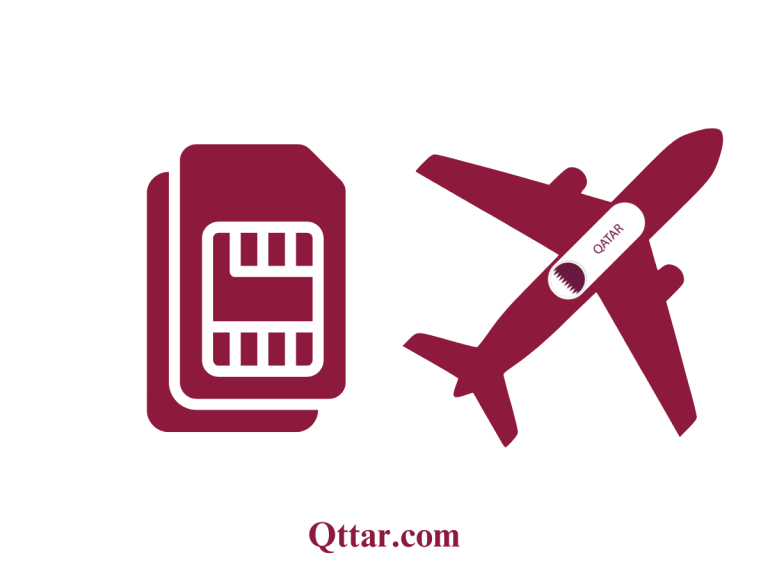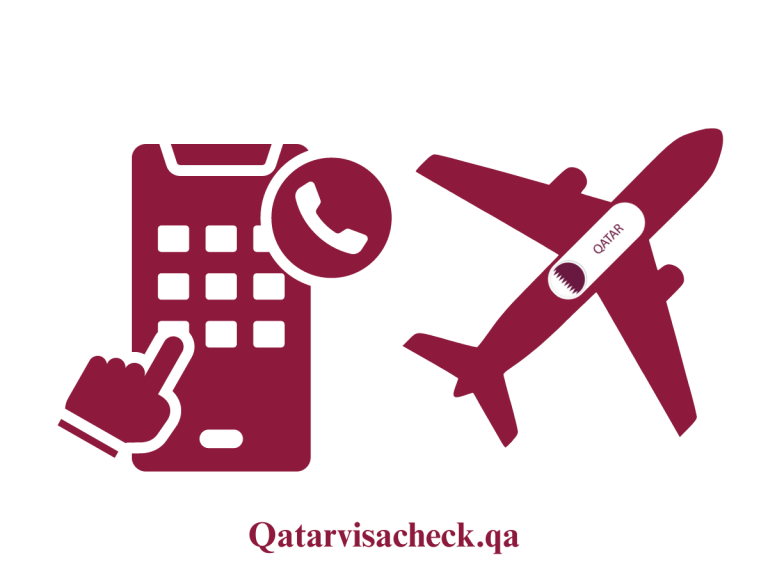Cost of living in Qatar: All Details (2025)
The average monthly cost of living in Qatar for a family of four is around 11,750 QAR (3,230 USD) without rent, while a single person’s costs are about 3,300 QAR (905 USD) without rent. Qatar has a high cost of living compared to many countries, especially for housing and imported goods.
Overview of Qatar’s Economy and Cost of Living
Qatar has one of the highest per capita incomes in the world due to its vast oil and natural gas reserves. The country’s GDP per capita was $112,280 in 2024, making it the fifth richest country globally. This wealth has led to rapid development and modernization, particularly in the capital city of Doha.
However, the high level of economic development also means Qatar has a relatively high cost of living compared to many other countries. While some aspects of life in Qatar can be quite expensive, especially housing and imported goods, the lack of income tax and government subsidies on some items help offset costs for residents.
Key Economic Indicators
- GDP (2024): $244.7 billion (Wikipedia)
- GDP per capita (2024): $112,280
- GDP growth rate: 2.0% (2024 forecast)
- Inflation rate: 2.6% (2024 forecast)
- Unemployment rate: 0.1% (2024 estimate)
Cost of Living Rankings
According to various cost of living indices, Qatar and its capital Doha rank as follows:
- Mercer Cost of Living Index 2023: Doha ranked 117th out of 227 cities globally
- Numbeo Cost of Living Index 2024: Qatar ranked 37th out of 121 countries
While not among the most expensive places globally, Qatar does have a higher cost of living than many countries in the Middle East and other parts of the world. However, it is generally considered more affordable than cities like Dubai, London, or New York.
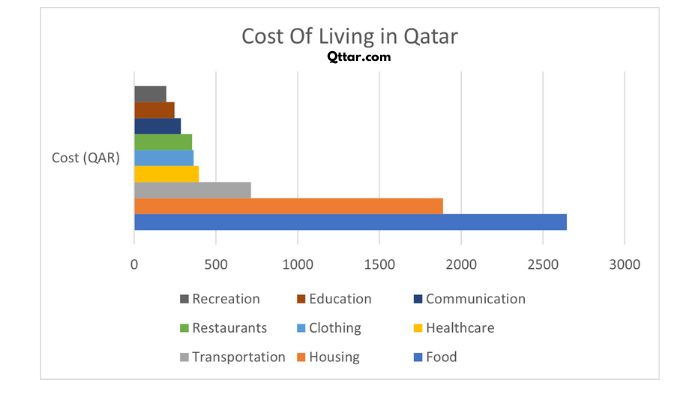
Housing Costs in Qatar
Housing is typically the largest expense for residents of Qatar, particularly in Doha and other urban areas. Rental prices can vary significantly based on location, size, and amenities.
Rental Costs
Average monthly rental prices in Qatar:
| Type of Housing | City Center | Outside City Center |
|---|---|---|
| 1 bedroom apartment | 5,720 QAR | 3,600 QAR |
| 3 bedroom apartment | 9,920 QAR | 6,670 QAR |
Rental prices in popular expat areas of Doha like West Bay or The Pearl tend to be on the higher end of these ranges. More affordable options can be found in older areas of the city or in suburban developments.
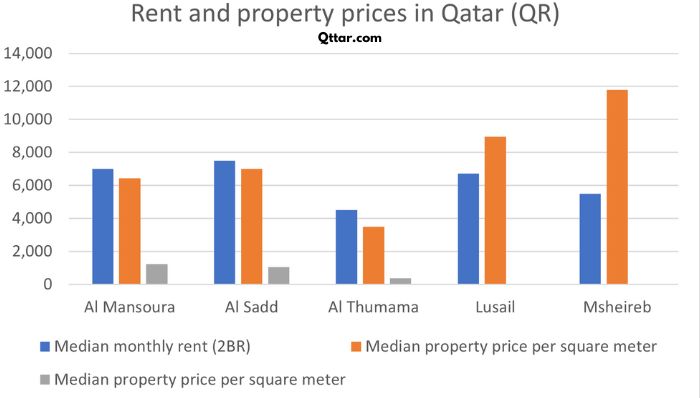
Utilities
Monthly utilities for an 85m2 apartment average around 380 QAR. This typically includes:
- Electricity
- Water
- Cooling (air conditioning)
- Garbage collection
Internet and mobile phone plans are additional expenses:
- High-speed internet (60+ Mbps): 325-400 QAR per month
- Mobile plan with calls and 10GB+ data: 160-300 QAR per month
Buying Property
For those looking to purchase property, average prices per square meter are:
- City center: 17,960 QAR
- Outside city center: 12,940 QAR
Non-Qatari citizens are restricted in where they can purchase property, with options mainly limited to specific freehold zones.
Food and Grocery Costs
Food costs in Qatar can vary widely depending on whether you primarily buy local or imported products. Many staple foods are imported, which can increase prices.
Grocery Prices
Average prices for common grocery items:
| Item | Average Price (QAR) |
|---|---|
| Milk (1 liter) | 7.70 |
| Bread (500g loaf) | 5.70 |
| Rice (1kg) | 7.80 |
| Eggs (12) | 9.95 |
| Chicken (1kg) | 29.80 |
| Beef (1kg) | 39.00 |
| Apples (1kg) | 7.20 |
| Bananas (1kg) | 5.65 |
| Tomatoes (1kg) | 4.85 |
| Potatoes (1kg) | 3.40 |
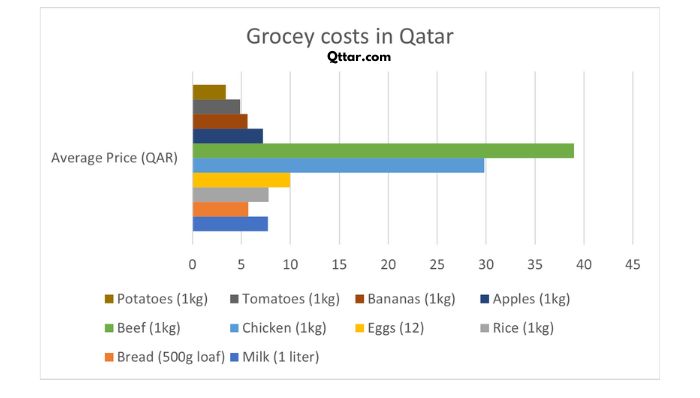
Dining Out
Eating out can be relatively expensive in Qatar, especially at higher-end restaurants. Average prices:
- Meal at an inexpensive restaurant: 30 QAR
- Three-course meal for two at a mid-range restaurant: 200 QAR
- Fast food combo meal: 27 QAR
Transportation Costs
Qatar has invested heavily in public transportation infrastructure in recent years, including a new metro system in Doha. However, many residents still rely on private vehicles or taxis.
Public Transportation
- Single metro or bus ticket: 2-5 QAR
- Monthly pass: 120 QAR
Taxis and Ride-hailing
- Starting fare: 8 QAR
- Per kilometer rate: 8 QAR
Private Vehicle Costs
- Gasoline (1 liter): 2.07 QAR
- New car (Toyota Corolla or equivalent): 74,000-80,000 QAR
Healthcare Costs
Qatar provides free or heavily subsidized healthcare to citizens and residents working in the public sector. However, many expats rely on private healthcare.
Health Insurance
Health insurance is mandatory for all residents. Costs vary based on coverage, but a basic plan might start around 1,500-2,000 QAR per year for an individual.
Medical Costs
Without insurance, medical costs can be high:
- Doctor’s visit: 200-400 QAR
- Dentist check-up: 250-500 QAR
- Prescription medication: Varies widely
Education Costs
Education can be a significant expense for families with children in Qatar, especially those using private international schools.
School Fees
- Preschool/Kindergarten: 3,000-5,000 QAR per month
- International primary school: 40,000-50,000 QAR per year
Higher Education
Qatar has several international university campuses, but costs can be high:
- Undergraduate tuition: 50,000-100,000 QAR per year (varies by program)
Entertainment and Leisure Costs
Qatar offers a range of entertainment options, from traditional souqs to modern malls and cultural attractions.
Fitness and Sports
- Gym membership: 400-1,000 QAR per month
- Tennis court rental: 130 QAR per hour
Cinema and Culture
- Movie ticket: 45 QAR
- Museum entry: Often free or low-cost
Shopping
Qatar is known for its luxury shopping, but prices for clothing and personal items can be high:
- Jeans (Levi’s or similar): 215 QAR
- Summer dress (chain store): 190 QAR
- Running shoes (Nike or similar): 340 QAR
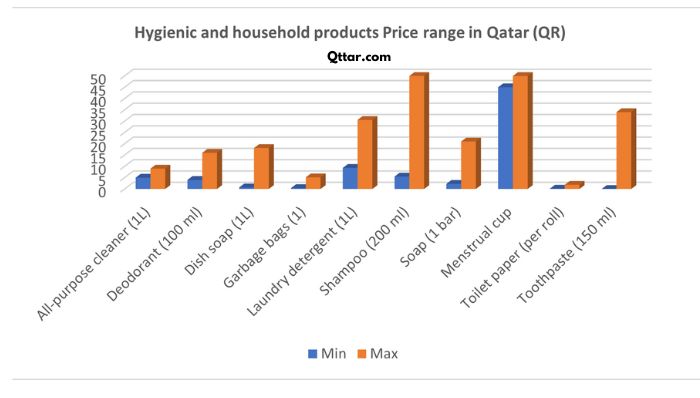
Comparison to Other Countries
To put Qatar’s cost of living in perspective, it’s helpful to compare it to other countries:
- 56.5% cheaper than New York City
- 44.3% cheaper than London
- 31.8% cheaper than Amsterdam
- 163.1% more expensive than Delhi
- 171.3% more expensive than Kathmandu
- 200.1% more expensive than Dhaka
- 218.8% more expensive than Cairo
While Qatar is more affordable than some major global cities, it is significantly more expensive than many developing countries.
Factors Affecting Cost of Living
Several factors contribute to Qatar’s cost of living:
- Reliance on imports: Qatar imports a large portion of its food and consumer goods, which can drive up prices.
- High-quality infrastructure: Significant investment in modern infrastructure contributes to higher overall costs.
- Energy subsidies: Government subsidies on fuel and utilities help keep some costs lower than they might otherwise be.
- Tax-free income: The lack of income tax allows for higher disposable incomes, which can drive up prices for goods and services.
- Housing demand: A growing population and limited housing stock in desirable areas keep rental and purchase prices high.
Budgeting for Life in Qatar
When planning a move to Qatar, it’s important to consider all aspects of the cost of living. Here’s a sample monthly budget for a single person:
| Expense Category | Estimated Cost (QAR) |
|---|---|
| Rent (1 bedroom apartment) | 4,500 |
| Utilities | 400 |
| Groceries | 1,000 |
| Transportation | 500 |
| Healthcare (insurance) | 150 |
| Entertainment | 1,000 |
| Miscellaneous | 500 |
| Total | 8,050 |
This budget assumes a moderate lifestyle and may need to be adjusted based on individual preferences and circumstances.
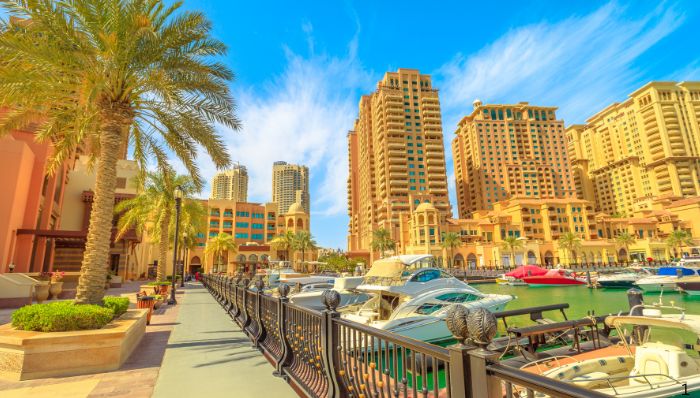
Tips for Managing Costs in Qatar
- Housing: Consider sharing accommodation or living in less expensive areas to reduce rental costs.
- Food: Shop at local markets for fresh produce and cook at home to save on food expenses.
- Transportation: Use public transportation when possible, especially in Doha where traffic can be congested.
- Entertainment: Take advantage of free cultural events and outdoor activities.
- Shopping: Look for sales and shop at outlet malls for discounts on clothing and household items.
- Utilities: Be mindful of energy usage, especially air conditioning, to keep utility bills in check.
- Healthcare: Ensure you have comprehensive health insurance to avoid high out-of-pocket medical costs.
Future Outlook
Qatar’s cost of living is likely to remain relatively high in the coming years due to continued economic growth and development. However, several factors could impact future costs:
- Economic diversification: Efforts to diversify the economy away from oil and gas could affect overall economic conditions and costs.
- Population growth: Continued population growth may put pressure on housing and other resources, potentially driving up costs.
- Global economic conditions: As a major exporter of natural gas, Qatar’s economy is influenced by global energy markets, which can impact local costs.
- Government policies: Changes in subsidies, taxes, or other policies could affect the cost of living for residents.
Frequently Asked Questions
- Is Qatar expensive to live in?
Qatar can be expensive, especially for housing and imported goods. However, the lack of income tax and some government subsidies help offset costs. - What is the average salary in Qatar?
The average monthly salary in Qatar is around 15,150 QAR (4,160 USD) after tax, but this can vary widely based on profession and experience. - How much does a house cost in Qatar?
House prices vary, but on average, apartments cost about 17,960 QAR per square meter in city centers and 12,940 QAR outside city centers. - Is healthcare free in Qatar?
Healthcare is free or heavily subsidized for Qatari citizens and some residents. Most expatriates need private health insurance. - How much does food cost in Qatar?
Food costs can be high, especially for imported items. A basic lunchtime meal might cost around 30 QAR, while a month’s worth of groceries for one person could be 1,000-1,500 QAR. - What is the cost of education in Qatar?
Education costs can be significant, especially for international schools. Annual fees for international primary schools average around 40,000-50,000 QAR. - Is public transportation expensive in Qatar?
Public transportation in Qatar is relatively affordable, with a monthly pass costing around 120 QAR. - How does the cost of living in Qatar compare to other Gulf countries?
Qatar’s cost of living is generally lower than Dubai or Abu Dhabi, but higher than Oman or Bahrain. - Are there any additional costs to consider when moving to Qatar?
Consider costs for visas, work permits, and potentially shipping belongings. Also factor in initial setup costs for housing and utilities. - Can expatriates save money while living in Qatar?
Many expatriates find they can save money in Qatar due to tax-free salaries and employer benefits, but this depends on individual circumstances and spending habits.

Ammara Abdullah is an experienced writer and editor specializing in technology and digital trends. With over 5 years of experience, she produces insightful articles on emerging tech, consumer electronics, and digital culture. Ammara holds a degree in journalism and is passionate about making complex topics accessible to readers.


